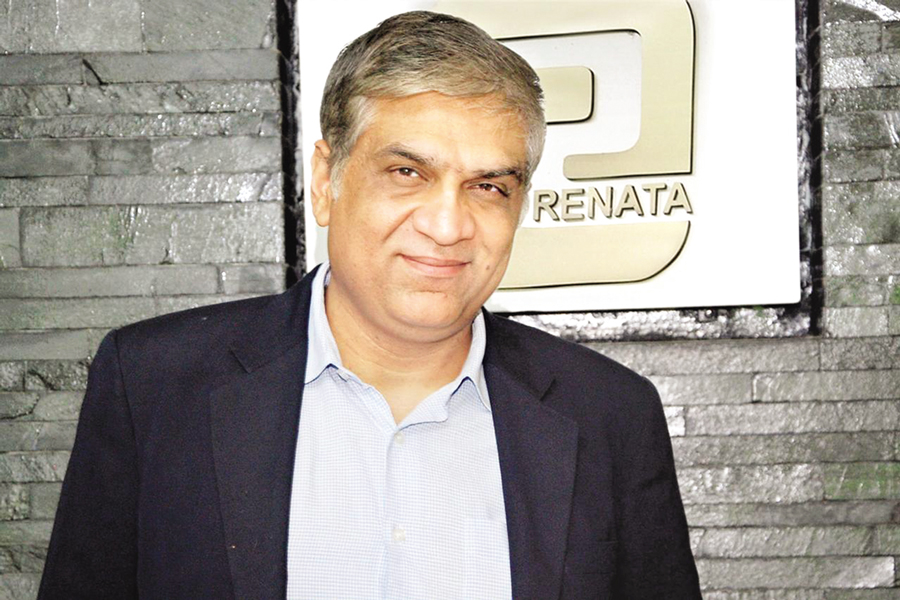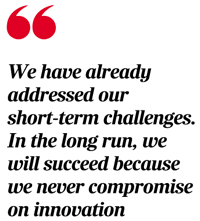INTERVIEW
Renata aims to reclaim its ‘place at the top’ with innovation
Says CEO Syed S Kaiser Kabir in an interview with the FE

Published :
Updated :

 Renata is well-positioned to regain its leadership position in the pharmaceutical sector through cost-effective innovation of new products and efficient business models, said its chief.
Renata is well-positioned to regain its leadership position in the pharmaceutical sector through cost-effective innovation of new products and efficient business models, said its chief.
Investors may have gone wary about the direction of the business as key financial data shows a slowdown in growth in the last couple of fiscal years but Syed S Kaiser Kabir, managing director and CEO of Renata, is confident that the company's heavy investments in research and product development during the period will soon make visible outcome.
As The Financial Express sat with him recently for an exclusive interview, he shared why the drug maker's profit had fallen and then plateaued while an expansion, which was already in progress, suffered a blow for unforeseeable global and local events.
In making his points, Mr. Kabir, an Oxford alumnus, cited both short-term and long-term strategies that underscore the company's resilience and forward-looking vision.
Until FY22, Renata was the second-most profitable listed drug manufacturer on the Dhaka Stock Exchange (DSE), trailing only Square Pharmaceuticals. In FY23, Beximco Pharmaceuticals surpassed Renata in profitability.
 Renata's net profit stood at Tk 5.11 billion in FY22 but plunged to Tk 2.34 billion in FY23 before rebounding to Tk 3.62 billion in FY24.
Renata's net profit stood at Tk 5.11 billion in FY22 but plunged to Tk 2.34 billion in FY23 before rebounding to Tk 3.62 billion in FY24.
Meanwhile, Beximco Pharmaceuticals reported a profit of Tk 4.99 billion in FY22, which increased to Tk 5.83 billion in FY24.
Renata's net profit margin also declined-- from 16.45 per cent in FY22 to 7.09 per cent in FY23 -- before recovering slightly to 9.59 per cent in FY24.
While explaining the financial results, Mr. Kabir, who holds an MPhil in economics from the University of Oxford, said the challenges began in 2020.
"At that time, we projected significant demand growth and decided to expand our production capacity. With annual profits of Tk 5 billion and another Tk 5 billion in bank deposits, we decided to finance our Tk 10 billion investment through short-term debts, avoiding long-term liabilities, as we are traditionally debt-averse," he said.
But Covid-19 upended the plan.
The supply of machinery got delayed by nearly one and a half years. Then came the Russia-Ukraine war, and the US dollar shot up from Tk 84 to Tk 120.
"Our planned Tk 10-billion investment ballooned to Tk 14 billion. As a result, our loan burden and interest expenses soared, and raw material costs increased significantly due to import dependency," Mr. Kabir explained.
Despite these challenges, Renata has taken decisive steps to stabilize its finances.
"We're actively replacing high-cost short-term loans with low-cost long-term alternatives, including preference shares and financing from the International Finance Corporation (IFC)," said Mr. Kabir.
Renata is going to issue non-cumulative, redeemable, and fully convertible preference shares through private placement to reduce its high-cost bank loans. Additionally, the IFC has committed $58 million in long-term financing earlier this month, further strengthening Renata's capital base.
Confident in the company's recovery and future growth, Mr. Kabir stated, "We have already addressed our short-term challenges. In the long run, we will succeed because we never compromise on innovation."
The company began its journey in 1972 as Pfizer (Bangladesh) Ltd. In 1993, Pfizer transferred the ownership of its Bangladesh operations to local shareholders, who renamed the company as Renata Ltd.
Syed Humayun Kabir, the first managing director of the Bangladesh chapter of Pfizer, took charge of Renata as the founder chairman.
Renata's headquarter is located in Mirpur, Dhaka, and the company manufactures more than 670 products across 306 brands in 69 therapeutic areas, including medicines, nutritional products, and vaccines for humans as well as animals.
Renata has been the market leader in animal health for 30 years, with about 95 products, and operates a strong contract manufacturing business, partnering with organisations such as UNICEF and SMC.
The CEO reiterated Renata's commitment to research and quality. "We will win because we never compromise on the quality of our medicines or our R&D budget. We are continuously developing new medicines and have already diversified our market presence globally."
This commitment is yielding results. Renata's exports surged 34.5 per cent year-on-year in US dollars and 61.8 per cent year-on-year in Taka in FY23 amid a sharp currency devaluation, raising its share in Bangladesh's pharmaceutical exports from 7.45 per cent in FY22 to 10.78 per cent in FY23.
The company expanded its global footprint to more than 50 countries, including key markets like the UK, Ireland, Denmark, Myanmar, Pakistan, and Sri Lanka.
Renata's exports grew 4 per cent year-on-year in FY24 and then export revenue jumped further 22.5 per cent in the nine months through March this year compared to the same period a year ago.
Last year, the company entered the US and Australian markets, a major milestone in expanding its global presence.
The next generation of leadership has already begun making an impact. Syed Omar Kabir, the grandson of founder Syed Humayun Kabir and son of the current CEO, serves as general manager of Renata's pharmaceutical business.
Mr. Kabir highlighted Renata's investments in human capital. "We are investing heavily in our employees. If you visit our facility, it feels like a university. We're nurturing world-class talents because we aim to compete globally and proudly represent Bangladesh on the world stage."
Renata also stands out for its social impact. The SAJIDA Foundation, which holds a majority stake in the company, reinvests 51 per cent of Renata's profit into healthcare, microfinance, and other community empowerment programmes. It is a combination of business enterprise and charity.
While Mr. Kabir exuded confidence all along, he expressed concerns, especially regarding local pricing regulations.
"We're currently facing challenges in setting product prices in Bangladesh. If the government supports us, our journey will be much smoother.
"Even if we are allowed to increase prices, we remain competitive. There are cases where a slight price hike caused us to lose our market leadership for four years."
While there have been temporary setbacks, Mr. Kabir concluded by saying, "We will win this race and reclaim our place at the top with our cost-effective innovation and strategic market diversification."
farhan.fardaus@gmail.com


 For all latest news, follow The Financial Express Google News channel.
For all latest news, follow The Financial Express Google News channel.